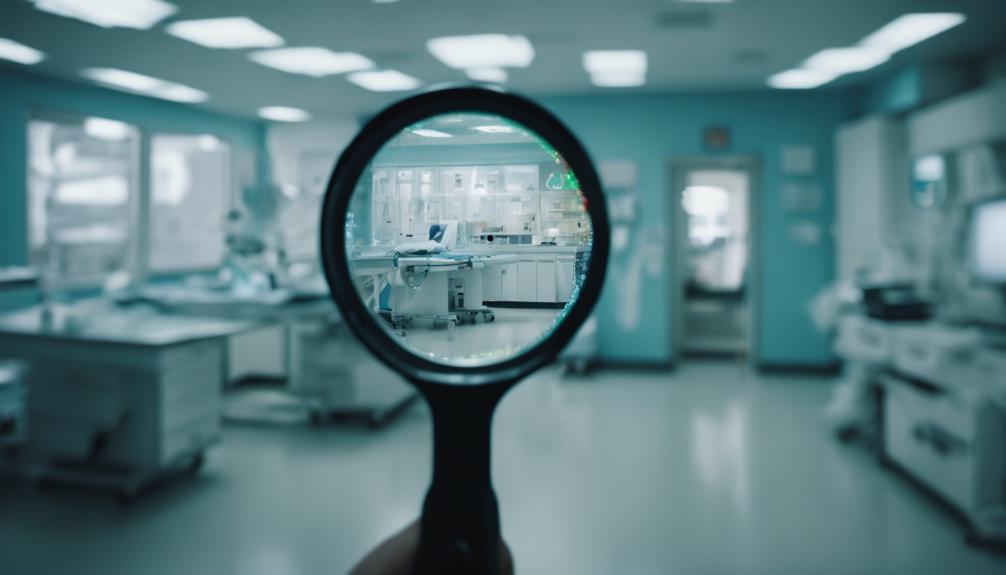Cedars-Sinai Caught Sharing User Data With Advertisers
The recent allegations against Cedars-Sinai, a renowned healthcare institution, for sharing user data with advertisers without consent, has sparked a significant debate around privacy and ethical data handling in the healthcare sector. This incident, involving the transmission of sensitive information to tech giants such as Meta, Google, and Microsoft, raises pertinent questions about the balance between digital innovation and user privacy. As we explore the legal entanglements and the broader implications of such practices on patient trust and data protection standards, one must ponder: where should the line be drawn in the increasingly digital landscape of healthcare?
Key Takeaways
- Cedars-Sinai used third-party tracking tools to share data with advertisers like Meta, Google, and Microsoft.
- The data sharing lacked clear benefits for consumers, raising privacy concerns.
- A lawsuit was filed against Cedars-Sinai for alleged privacy violations related to tracking pixels.
- Cedars-Sinai removed the Meta pixel in 2022 following allegations of unauthorized data sharing.
Background of Data Breaches

In recent years, the cybersecurity landscape has witnessed a significant uptick in data breach incidents, affecting institutions like Planet Home Lending and Academy Mortgage, where hundreds of thousands of customers' sensitive information has been put at risk. These breaches not only compromise personal and financial data but also erode trust between consumers and corporations. For professionals dedicated to serving others, understanding the gravity of these incidents is vital. Academy Mortgage's data breach, for instance, impacted over 284,000 customers and employees, emphasizing the vast scale of potential identity theft and financial fraud. Such incidents underscore the importance of robust cybersecurity measures and the need for organizations to prioritize the protection of customer data as a fundamental aspect of their service commitment.
Planet Home Lending Incident

Nearly 200,000 customers found themselves at risk of identity theft following the Planet Home Lending data breach incident. This unsettling event underscores the permanent jeopardy these individuals now face, highlighting the critical need for robust identity protection measures. The breach not only exposed sensitive information but also served as a stark reminder of the potential consequences that can ensue when personal data is compromised. In response, it is indispensable for those affected to remain vigilant and proactive in safeguarding their financial and personal information. The incident calls for a collective effort towards enhancing data security protocols and promoting awareness on how to effectively protect oneself against the ever-present threat of identity theft. This situation is a pivotal moment for reflection on our responsibilities to guarantee the safety and security of personal data.
Academy Mortgage Breach Details

Reflecting on the Planet Home Lending incident underscores the importance of addressing the Academy Mortgage data breach, which impacted approximately 284,000 customers and employees. This breach, confirmed in 2023, exposed individuals to significant risks, emphasizing the need for vital data protection efforts. The sizable impact on those affected cannot be overstated, as personal and potentially sensitive information was compromised. In response, Academy Mortgage has taken several steps to mitigate the damage and prevent future breaches. These measures are essential for restoring trust and ensuring the safety of customer and employee data. The incident serves as a stark reminder of the ongoing challenges in safeguarding personal information and the collective responsibility to prioritize and enhance data security practices.
Cedars-Sinai Data Sharing Allegations

Cedars-Sinai has faced allegations concerning the unauthorized sharing of user data through third-party tracking tools on its website and mobile application. Reports indicate that this prestigious medical institution may have allowed real-time wiretaps for data transmission to various advertisers, including giants like Meta, Google, and Microsoft. These actions have raised significant concerns among patients and the wider community, emphasizing a lack of direct benefits for the consumers whose data was shared. The core of these allegations lies in the potential violation of trust, as individuals seeking medical care did not anticipate their sensitive information being utilized for advertising purposes. This situation underscores the critical need for stringent privacy safeguards and ethical considerations in handling patient data, especially within the healthcare sector dedicated to serving the public's well-being.
Legal Actions Against Cedars-Sinai

Following the allegations of unauthorized data sharing, Cedars-Sinai now faces legal scrutiny as a lawsuit has been filed against the hospital for alleged privacy violations. This development underscores the gravity with which society views the safeguarding of personal information, particularly within the healthcare sector. The legal action seeks to hold Cedars-Sinai accountable for the use of tracking pixels, which allegedly compromised patient privacy by sharing data with entities such as Meta, Google, and Microsoft without explicit consent. This lawsuit represents a pivotal moment for privacy advocacy, emphasizing the importance of transparent data practices and the protection of sensitive information. It serves as a reminder to organizations across all sectors that the trust of those they serve is paramount and that legal accountability can follow lapses in upholding privacy standards.
Data Privacy Concerns

The growing unease surrounding the safety of personal information in the digital age has greatly magnified concerns about data privacy. With incidents like Cedars-Sinai's alleged unauthorized sharing of user data with advertisers, the spotlight is on the ethical stewardship of sensitive information. Those dedicated to serving others recognize the paramount importance of safeguarding patient and customer data. It's not merely about compliance with laws but embodying a commitment to respect and protect individual privacy. The revelations serve as a clarion call for institutions to reassess their data handling practices, ensuring they align with the values of confidentiality and trust that form the bedrock of their service to the community. Aiming for transparency and stringent data protection measures is essential in restoring and maintaining public trust.
Lawsuit Against Cedars-Sinai Explained

A legal challenge has been initiated against Cedars-Sinai Medical Center, stemming from allegations of unauthorized user data sharing with third-party advertisers. This lawsuit highlights significant concerns regarding the privacy of individuals who trusted the institution with their sensitive health information. The core of the issue lies in the alleged use of tracking pixels and other tools on the hospital's website and mobile app, purportedly to collect data without explicit consent from users. This data was then allegedly shared with major tech companies, including Meta, Google, and Microsoft, for advertising purposes. The lawsuit seeks not only to address these privacy violations but also to set a precedent for the safeguarding of patient data in the digital age, underscoring the importance of consent and transparency in data handling practices.
Impact on Patient Trust

Revelations of unauthorized data sharing have greatly eroded patient trust in Cedars-Sinai Medical Center. When individuals seek medical care, they do so with the expectation that their personal and health information remains confidential and secure. The discovery that sensitive data was shared without consent has breached this fundamental expectation, creating a rift between the institution and the community it serves. Patients, who entrust healthcare providers with their most private information, now face the dilemma of questioning the safety and privacy of their data. The impact of these revelations extends beyond the immediate concerns of privacy, potentially affecting patient willingness to seek care or share necessary information for their treatment, thereby undermining the very essence of healthcare provision.
Data Protection Measures

In light of recent incidents, it is essential to discuss the enhanced data protection measures that need to be implemented to safeguard patient information effectively. Hospitals and healthcare providers must adopt stringent data privacy frameworks that not only comply with existing regulations but also anticipate future vulnerabilities. This involves encrypting patient data, conducting regular security audits, and ensuring that third-party vendors adhere to the highest standards of data protection. Training staff on the importance of data privacy and the potential consequences of breaches is also vital. By fostering a culture that prioritizes patient confidentiality above all, healthcare organizations can restore trust and demonstrate their unwavering commitment to serving the community responsibly. These steps are not just necessary; they are a moral imperative in the face of evolving digital threats.
Healthcare Industry Repercussions

The recent data breaches and allegations of unauthorized data sharing in the healthcare sector have profound implications for the industry, raising serious concerns about the adequacy of existing privacy safeguards. These incidents underscore the urgent need for healthcare organizations to fortify their data protection measures and adhere to the highest standards of patient confidentiality. The trust patients place in these institutions is paramount, and any breach of this trust can have lasting repercussions, not only for the individuals affected but also for the reputation and operational integrity of the healthcare providers involved. It is imperative for the healthcare sector to embrace a culture of transparency and accountability, ensuring that patient data is handled with the utmost care and respect. This commitment to privacy must be unwavering, as the well-being of patients and the public's confidence in the healthcare system hang in the balance.
Frequently Asked Questions
How Can Patients and Users Safeguard Their Personal Data From Future Breaches or Unauthorized Sharing When Using Healthcare Services Online?
To safeguard personal data while utilizing online healthcare services, patients and users should prioritize engaging with reputable providers that transparently communicate their data privacy policies. It is essential to review these policies carefully, utilize strong, unique passwords for online accounts, and enable two-factor authentication where available. Additionally, individuals should limit the sharing of sensitive information unless absolutely necessary and stay informed about potential data breaches to take prompt action if needed.
What Specific Steps Has Cedars-Sinai Taken to Ensure the Privacy of Patient Data Shared With Third-Party Advertisers Since the Allegations Surfaced?
In response to concerns regarding patient data privacy, Cedars-Sinai has initiated several measures to enhance the security and confidentiality of patient information. These steps include a thorough review of data-sharing practices, the implementation of stricter data access controls, and the reinforcement of partnerships with third parties to guarantee adherence to privacy standards. Additionally, Cedars-Sinai is committed to continuous improvement of its privacy policies to protect patient data effectively.
Are There Any Proactive Measures Individuals Can Take to Find Out if Their Data Was Shared Without Consent, and What Recourse Do They Have if It Was?
In an era where digital privacy is akin to a mythical unicorn, individuals are increasingly vigilant about safeguarding their personal data. To ascertain if their information has been shared without consent, individuals can review privacy policies of institutions they interact with, request their data records, and utilize data protection tools. If unauthorized sharing is discovered, legal recourse is available through filing complaints with regulatory authorities or pursuing legal action against the violating entity.
How Do the Data Sharing Practices of Cedars-Sinai Compare With Those of Other Leading Healthcare Institutions, and What Standards Are Being Set Industry-Wide to Prevent Such Incidents?
In comparing data sharing practices across leading healthcare institutions, one must note that standards and regulations, such as HIPAA in the United States, are designed to protect patient information. However, the implementation and adherence to these standards can vary greatly. Industry-wide, there is a growing emphasis on enhancing data protection measures and ensuring transparency in data handling to prevent unauthorized sharing, reflecting a commitment to safeguarding patient privacy and fostering trust.
What Role Do Regulatory Bodies Play in Monitoring and Enforcing Data Protection Standards in the Healthcare Industry, and Have Any Actions Been Taken Against Cedars-Sinai or Similar Institutions for Such Breaches?
Sailing through the murky waters of data protection in the healthcare sector, regulatory bodies play an essential role in setting and enforcing standards. These organizations, such as the Health and Human Services Office for Civil Rights in the U.S., actively monitor compliance and have the authority to investigate breaches. Actions against institutions, including inquiries and penalties, serve as deterrents, emphasizing the necessity of stringent data security measures to safeguard patient information.
Conclusion
In the shadow of towering data breaches, the Cedars-Sinai incident unfurls as a stark reminder of the fragility of digital trust. Within the labyrinthine corridors of healthcare data, the juxtaposition of patient care against the backdrop of unauthorized data sharing paints a vivid tableau of the modern privacy conundrum. This episode underscores the imperative for fortified data protection measures, heralding a pivotal moment for the healthcare industry to restore integrity and reforge the bond of trust with its denizens.

This post has been generated by AI and was not reviewed by editors. This is Not legal advice. Please consult with an attorney.
